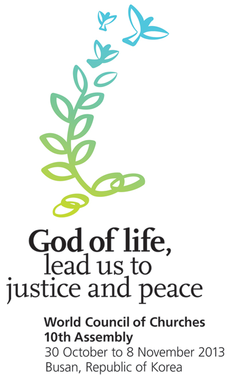Assembly renews churches’ commitment towards justice and peace
08 November 2013
The World Council of Churches (WCC) 10th Assembly in Busan, Republic of Korea, concluded on 8 November, acting to inspire churches to renew their commitments to justice and peace. Through varied encounters and dialogue within the fellowship of churches, the Assembly has made concrete decisions and recommendations setting priorities for the future work of the WCC.
The Assembly, highest governing body of the WCC which meets every seven years, reviewed programmatic activities of the WCC, issued public statements and recorded minutes of concern, endorsing engagement and action by the churches around the world.
The Assembly also elected a new top governing body to lead the WCC into its new mandate.
“This assembly has provided a significant momentum for the ecumenical movement,” said the WCC general secretary Rev. Dr Olav Fykse Tveit during a press meeting on 7 November in Busan.
Tveit said that the WCC 10th Assembly has an important dimension, being held in the Republic of Korea; this has brought churches closer to the realities of an unresolved conflict. He said that through the WCC 10th Assembly, churches have been able to express solidarity with Korean people across South and North, strengthening the WCC’s efforts for peace and reunification on the Korean peninsula.
Tveit stressed the importance of addressing the issues of migrants. “We see refugees trying to enter Europe for a variety of reasons – climate change as well as political reasons. This is a situation that must now be addressed at an international level,” he said.
Tveit affirmed that the WCC mandate presented at the assembly endorses that “we in Christian solidarity do not only support one another but reach out to anyone, who need our support and speaks out in front of the powers seeking peace and justice,” said Tveit.
"The WCC has an important role of being part of the wider ecumenical reflection on the definition and initiatives for mission and evangelism," said Tveit. "We carry a legacy of important discussions about mission; but we also represent a richness of traditions and churches' practices of mission in their daily lives," he added.
In his conclusion, Tveit identified "just peace" as an important component in the strategic direction for the work of the WCC. He stressed the significance of defining future priorities, as well as reflecting on the "unique value" of WCC programs.
The WCC assembly, which gathered some 3,000 participants from around the world from 30 October to 8 November, addressed the theme “God of life, lead us to justice and peace”.
Decisions, reflections, prayers close the WCC assembly
The Assembly reviewed the work of the WCC, using the report Faith That Does Justice: The Journey of the WCC from Porto Alegre to Busan. Areas of ecumenical engagement and concerns outlined include eco-justice, peace-building and advocacy, incorporating theological understandings and promoting ecumenical formation of youth.
It is in the context of the “pilgrimage of justice and peace” that we hope to further the WCC programmes inspiring the churches to work together, said Rev. Sharon Watkins, moderator of the WCC’s programme guidelines committee.
While new directions in the financial strategy for the WCC’s work were developed, the WCC Assembly also received a financial report presented in Busan.
The Assembly took action by adopting statements and minutes on issues including peace and reunification of the Korean peninsula, politicization of religion and the rights of religious minorities, human rights of stateless people, and working towards just peace.
The delegates expressed concern on Christian presence and witness in the Middle East, the situation in the Democratic Republic of Congo, among other issues raised at the assembly.
The Assembly has elected a 150-person Central Committee which will serves as the decision-making body of the WCC until the next assembly in 7 to 8 years. The new committee counts 39% women, 61% men; 13% youth, 5% indigenous persons, 2%, persons with disabilities; ordained: 68%, and 32% of the members of the WCC Central Committee are lay persons.
The WCC Central Committee has elected Dr Agnes Abuom from the Anglican Church of Kenya as moderator, and as vice-moderators Metropolitan Gennadios of Sassima of the Ecumenical Patriarchate of Constantinople and Rev. Dr Mary Ann Swenson of the United Methodist Church, USA.
The Assembly has also appointed eight presidents to represent the WCC in their respective regions. The WCC presidents are Rev. Dr Mary-Anne Plaatjies van Huffel (Africa), Rev. Prof. Dr Sang Chang (Asia), Archbishop Anders Wejryd(Europe), Rev. Gloria Nohemy Ulloa Alvarado (Latin America and the Caribbean), Bishop Mark MacDonald (North America), Rev. Dr Mele’ana Puloka (Pacific), H.B. John X Patriarch of the Greek Orthodox Church of Antioch and All the East (Eastern Orthodox Churches) and Karekin II, the Supreme Patriarch and Catholicos of All Armenians (Oriental Orthodox Churches).
A prayer service giving thanks and sending participants in peace closed the WCC 10th Assembly. Fr Michael Lapsley, SSM (Society of the Sacred Mission), who preached the homily at the closing prayer, said, “I pray that all of us will leave here inspired by God’s Holy Spirit to be Christ’s co-workers in the struggles for justice and peace”.
WCC Assembly addresses contemporary public (WCC news release of 8 November 2013)
Official website of the WCC 10th Assembly
High resolution photos available via photos.oikoumene.org





